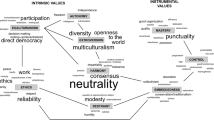Abstract
The increasing globalization of business and boundary-spanning government alliances has created a clash of values that can prevent effective working relationships. Given that each country wants to be considered an equal partner, this clash can strike at the core of effective communication. Various solutions posed to date have been unable to resolve this impediment. This treatise suggests a framework for establishing a shared set of values across cultures by focusing not on the ethics of business, but instead on the ethics of citizenship. A set of socio-ethical tenets is proposed as the basis for developing organizational ethics across cultures.
Similar content being viewed by others
References
Amstutz, M. R. (1999). International ethics: concepts, theories, & cases in global politics. New York: Rowman and Littlefield Publishers, Inc.
Ardichvili, A., Mitchell, J., & Jondle, D. (2009). Characteristics of ethical business cultures. Journal of Business Ethics, 85, 445–451.
Ardichvili, A., Kowske, B., & Li, J. (2012). Ethical cultures in large business organizations in Brazil, Russia, India, and China. Journal of Business Ethics, 105, 415–428.
Ardrey, R. (1974). The social contract: a personal inquiry into the evolutionary source of order and disorder. New York: Dell Publishing.
Ashforth, B. E., & Mael, F. (1989). Social identity theory and the organization. Academy of Management Review, 14(1), 20–39.
Beitz, C. R. (1979). Political theory and international relations. Princeton: Princeton University Press.
Berns, G. S., Jonathan, C., Zink, C. F., Pagnoni, G., Martin-Skurski, M. E., & Richards, J. (2005). Neurobiological correlates of social conformity and independence during mental rotation. Biological Psychiatry, 58, 245–253.
Beschorner, T., & Muller, M. (2007). Social standards: toward an active ethical involvement of businesses in developing countries. Journal of Business Ethics, 73, 11–20.
Brewer, M. B. (1979). In-group bias in the minimal intergroup situation: a cognitive-emotivational analysis. Psychological Bulletin, 86, 307–324.
Brune, M., Ribbert, H., & Schiefenhovel, W. (2003). The social brain: evolution and pathology. Hoboken: Wiley & Sons Ltd.
Calkins, M. J., & Werhane, P. H. (1998). Adam Smith, Aristotle, and the virtues of commerce. Journal of Value Inquiry, 32, 43–60.
Campbell, T. (2006). A human rights approach to developing voluntary codes of conduct for multinational corporations. Business Ethics Quarterly, 16, 255–269.
Choi, C. J., & Digol, D. (2010). Ethical infrastructure: a new requirement of the state’s industrial policy. Journal of Public Affairs, 10, 225–232.
Christakis, N. A., & Fowler, J. H. (2009). Connected: the surprising power of our social networks and how they shape our lives. New York: Little Brown and Company.
Cohen, D. (1993). Creating and maintaining ethical work climates: anomie in the workplace and implications for managing change. Business Ethics Quarterly, 3(4), 343–358.
Dawes, C. T., Loewen, P. J., Schreiber, D., Simmons, A. N., Flagan, T., McElreath, R. Bokkemper S. E., Fowler, J. H., & Paulus, M. P. (2012). PNAS. Proceedings of the national academy of sciences. www.pnas.org/cgi/doi/10.1073/pnas.1118653109
Estevez, I., Keeling, L. J., & Newberry, R. C. (2003). Decreasing aggression with increasing group size in young domestic fowl. Applied Animal Behaviour Science, 84, 213–218.
Friedman, B. M. (2005). The moral consequences of economic growth. New York: Knopf.
Hegel, G. (1870a). The philosophy of Plato. The Journal of Speculative Philosophy, 4(4), 320–380.
Hegel, G. W. F. (1870b). The philosophy of Plato. The Journal of Speculative Philosophy, 4(3), 225–268.
Hegel, G. (1871). The philosophy of Aristotle. The Journal of Speculative Philosophy, 5(1), 61–78.
Hobbes, T. (1660). The leviathan. Reprinted 1996. Mineola, NY: Dover Publications.
Hogg, M. A., & Terry, D. J. (2000). Social identity and self-categorization processes in organizational contexts. Academy of Management Review, 25(1), 121–140.
Lewis, H. D. (1939). Plato and the social contract. Mind, 48(189), 78–81.
Lyles, M. A., Saxton, T., & Watson, K. (2004). Venture survival in a transition economy. Journal of Management, 30, 351–375.
Michaelson, C. (2010). Revisiting the global business ethics question. Business Ethics Quarterly, 20(2), 237–251.
Moll, J., Zahn, R., de Oliveira-Souza, R., Krueger, F., & Grafman, J. (2005). The neural basis of human moral cognition. Neuroscience, 6, 799–809.
Morse, J. (1999). Who is the ethics expert? The original footnote to Plato. Business Ethics Quarterly, 9(4), 693–697.
Mujtaba, B. G., Tajaddini, R., & Chen, L. Y. (2011). Journal of Business Ethics, 104, 433–447.
Pagel, M., & Dawkins, M. S. (1997). Peck orders and group size in laying hens: ‘Futures contracts’ for non-aggression. Behavioral Processes, 40, 13–25.
Pearson, R., & Seyfang, G. (2001). New hope or false dawn? Voluntary codes of conduct, labour regulation and social policy in a globalizing world. Global Social Policy, 1(1), 49–78.
Plato. (2011). The republic. New York: Simon and Brown.
Ralston, D. (2008). The crossvergence perspective: reflections and projections. Journal of International Business Studies, 39, 27–40.
Rohr, J. (1998). Public service, ethics, and constitutional practice. Lawrence: University of Kansas Press.
Schein, E. H. (1992). Organizational culture and leadership. San Francisco: Jossey-Bass Publishers.
Scherer, A. G., & Palazzo, G. (2007). Toward a political conception of corporate responsibility: business and society seen from a Habermasian perspective. Academy of Management Review, 32, 1096–1120.
Schwab, K. (2008). Global corporate citizenship: working with governments and civil society. Foreign Affairs, 87(1), 107–118.
Stajkovic, A. D., & Luthans, F. (1997). Business ethics across cultures: a social cognitive model. Journal of World Business, 32(1), 17–34.
Svensson, G., Wood, G., Singh, J., & Callaghan, M. (2009). Implementation, communication and benefits of corporate codes of ethics: an international and longitudinal approach for Australia, Canada and Sweden. Business Ethics: A European Review, 18(4), 389–407.
Tajfel, H. (1981). Human groups and social categories: studies in social psychology. Cambridge: Cambridge University Press.
Windsor, D. (2004). The development of international business norms. Business Ethics Quarterly, 14, 729–754.
Zheng, H., Wang, X. T., & Zhu, L. (2010). Framing effects: behavioral dynamics and neural basis. Neuropsychologia, 48, 3198–3204.
Author information
Authors and Affiliations
Corresponding author
Rights and permissions
About this article
Cite this article
Jurkiewicz, C.L. Developing a Multicultural Organizational Code of Ethics Rooted in the Moral Obligations of Citizenry. Public Organiz Rev 12, 243–249 (2012). https://doi.org/10.1007/s11115-012-0187-6
Published:
Issue Date:
DOI: https://doi.org/10.1007/s11115-012-0187-6




